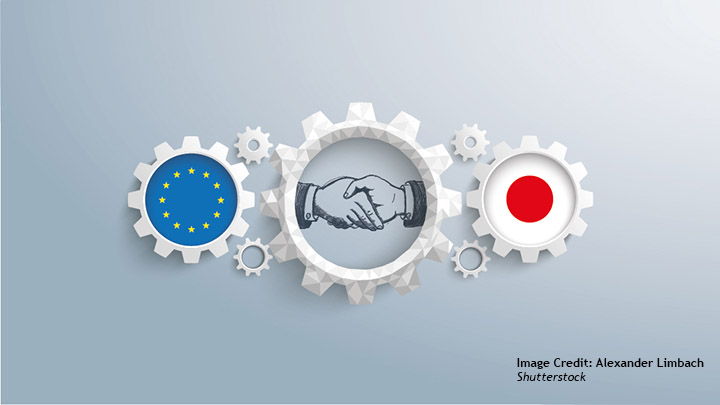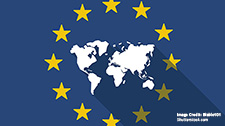Partners in a Post Covid-19 International Order? The EU-Japan Strategic Partnership Agreement (SPA)

Hiroki Sekine
In July 2018, Japan and the EU signed both the Economic Partnership Agreement (EPA) and the Strategic Partnership Agreement (SPA). The two agreements have been described as formally ushering in a new era of increased cooperation and global leadership between the two normative powers. To understand the significance of this cooperation, ISDP asked three authors to debate how effective the two agreements have been thus far and what we can expect from the strengthened partnership particularly during a time when the world is facing a global pandemic and an impending economic recession.
The three authors are; Axel Berkofsky, Senior Lecturer at the University of Pavia, Italy and Senior Associate Research Fellow at the Milan-based Istituto per gli Studi di Politica Internazionale (ISPI); Hiroki Sekine, Visiting Fellow at both Chatham House and ISDP and former Senior Advisor to the corporate planning department at the Japan Bank for International Cooperation (JBIC); And, Lars Vargö, Distinguished Fellow at ISDP and former Swedish Ambassador to Japan and South Korea.
You can read Axel Berkofsky’s paper here – Moving Beyond Rhetoric?
You can read Lars Vargö’s paper here – Close Partners or Hesitant Dreamers?
The following Issue Brief is written by Hiroki Sekine (pdf version)
Introduction
It has been widely reported that the EU is struggling to take united action in the battle against COVID-19. Italy’s Prime Minister, Giuseppe Conte, expressed in an interview with the BBC that the European Union needs to rise to the challenge of its biggest test since the Second World War, adding that the Union risks failing as a project in the coronavirus crisis. The EU managed, however, to announce a 500 billion Euro rescue package for member countries on April 10, 2020, after tough coordination talks in Brussels. The EU-Japan partnership, strengthened by the execution of two landmark agreements, namely the Economic Partnership Agreement (EPA) and the Strategic Partnership Agreement (SPA), also faces its first challenge as the partnership is tested under this unprecedented world-wide crisis of coronavirus pandemic.
Momentum of Partnership Amid COVID-19 Crisis
The EU-Japan partnership should be able to work effectively even during this crisis and some of the following examples prove how this is already happening. The EU and Japan keep close contact, including minister level communication in order to exchange information related to COVID-19. In addition, both parties maintain the momentum of policy coordination for other ongoing global challenges through virtual communication. For example, a meeting of high-level officials was held on April 01, 2020, in order to discuss the biodiversity and circular economy towards COP15 of the UN Convention on Biological Diversity in October 2020 and UN Environmental Assembly (UNEA5) in February 2021.
Another example is the Japanese economic stimulus package, launched on April 07, 2020, which involved its plan to provide, without a charge to the consumer, the anti-flu drug “Avigan” to countries hoping to use it to treat coronavirus patients. The drug is currently undergoing clinical tests. Japanese Foreign Minister Toshimitsu Motegi announced that the first 20 countries already signed up to receive the drug include; Bulgaria, the Czechia, Hungary, Slovenia, Estonia, Cyprus, Luxemburg, and Turkey, Serbia, Kosovo, Moldova, Georgia, Ukraine, and San Marino in addition to other six countries in Asia and the Middle East.
The support is an attempt of a global trial where those countries who receive the medicine are expected to share the results of their therapy and thereby provide enough data for expeditious approval. One interesting outcome was that the first entry to this framework involved more European countries than Asian. The aforementioned examples indicate that the global pandemic has not folded the momentum to construct a new era of partnership between the EU and Japan. With such developments within the partnership the next question should be, what do they want to achieve? And, will this new era last?
The SPA as the Protector of Universal Values
The EU and Japan singed the EPA and the SPA in July 2018 after long run discussions lasting almost five years. The EPA is expected to simply provide an economic benefit to the parties from free trade and investment between the EU and Japan. Japan estimate that the EPA would increase real GDP by approximately 1 percent. The EU estimate that the reduction of tariffs and non-tariff measures would add around 0.14 percent of real GDP and further increase around 13 billion euros of EU exports to Japan. On the other hand, the SPA determines a comprehensive framework which lists 40 areas for cooperation and the objective described in the agreement is more abstract. Therefore, questions may arise if the SPA is a kind of ceremonial document where both parties may see a different future, but just prioritized the signing at the same time as the EPA. Nevertheless, it should be worthy to note that this SPA involves special features which may deliver a fundamental change of the mutual relationship between the EU and Japan. Furthermore, the agreement has the potential to mark a historical turning point of dynamism for EU-Japan relations and their presence in the global community for the two principle reasons described below.
Firstly, the agreement aims to constitute deep and long-lasting cooperation based on shared common values and principles, rather than simply focusing on more specific outcomes in designated areas over a short period of time. The SPA clearly cites democracy, the rule of law, human rights, and freedoms as common core values. Japanese Prime Minister Shinzo Abe expressed in his speech at the EU-Asia Connectivity forum in September 2019, that “our SPA made us the guardians of universal values”, adding; “we take responsibility for carefully considering and then putting into practice what kinds of governance are desirable, and, if we are to establish rules, the kind we should establish.”
The EU and Japan share common views that the world is facing challenges that threaten to jeopardize a rules-based international order, centered upon democracy and freedom. The agreement aims to create a legal foundation for taking joint actions to tackle global challenges as like-minded partners. The newly launched partnership is also in line with the national agenda of each party. Japan has advanced its Free and Open Indo-Pacific (FOIP) initiative under Prime Minister Abe’s leadership since 2016, and has aimed to develop a free and open Indo-Pacific region through ensuring a rules-based international order to promote peace, stability and prosperity for every country across the region.
The EU makes continual efforts to maintain its principles of democracy, rules-based order, freedom, and joint economic prosperity within its own borders, particularly as there are a rising number of members undermining these principles by holding differing interpretations of the priorities of national governance. It could be argued that decline of U.S. interest in Europe and Chinese expansion through Belt and Road Initiative or cooperation framework between China and Central and Eastern Europe (17+1) pushed the EU to seeking such cooperation with Japan as a sort of counter weight. The EU-Japan SPA emphasizes “values” and “principles” rather than just economic synergy or industrial reliance usually observed in the other similar documents. This implies the parties desire to place the partnership as a new soft-power reliance lasting over many decades.
Secondly, the agreement envisions not only dealing with bilateral issues but also coping with global issues through cooperative actions in the international community. The agreement emphasizes the promotion of shared values and principles in the international fora or in third countries and furthermore proactive contribution to international peace and stability including peaceful settlements of disputes. It should require enormous efforts of each party to take coordinated actions for pressing global issues such as the current pandemic, climate change, cybersecurity, and peace building measures. With such efforts, the partnership would impact on decision-making in the international arena.
Despite the skepticism surrounding the agreement, there is evidence that the outcomes go beyond just rhetoric. This is demonstrated in a subsequent agreed document, namely “the partnership on sustainable connectivity and quality infrastructure between Japan and the European Union” known as – Connectivity Partnership. This connectivity partnership document was signed between the EU and Japan at the EU-Asia Connectivity Forum held in Brussels on September 27, 2019. It emphasized collaboration in connectivity and quality infrastructure and furthermore set their regional priority in the Western Balkans, Eastern Europe, Central Asia, the Indo-Pacific, and Africa. One-year following the SPA signing, progress has been made in concrete concepts taken from the agreed document.
The objective of the connectivity partnership is described as working together on all dimensions of connectivity including digital, transport, energy and people-to-people exchanges by taking into account the needs of the partner, their fiscal capacity and debt-sustainability. The document also describes the following principles of joint action in connectivity development, that being; openness, transparency, inclusiveness, and a level playing field for those concerned, as well as compliance with the G20 Quality Infrastructure Investment. At the same time, the parties ensure their commitment to full and effective implementation of the Paris Agreement on climate change. More concrete actions and specific sectors are partially indicated in the documents such as digital economy, transport connectivity, hydrogen, fuel cells, electricity markets regulation and the global market for liquefied natural gas, people-to-people exchanges between institutions in higher education and research sectors as well as collaboration between governmental financial institutions.
Policy Coordination in the Western Balkans and Indo-Pacific
There has been an inevitable political priority shift to address the global pandemic including measures to cope with the ongoing pressures on the healthcare systems as well as economic recovery measures that will last long after the worst outbreak in their respective countries. However, as stated at the introduction, there has been no indication that either party has chosen to retreat on any aspects of the SPA thus far. Nevertheless, a challenge remains if each party can motivate the agreement beyond its original priority.
For example, the regional priority of the EU should be set towards Eastern Europe and particularly the Western Balkans since many of these nations have been part of the EU’s accession process for a number of years and are at the frontline of the EU’s enlargement strategy. The former President of the European Commission Jean Claude Juncker referred to the Western Balkans as candidates to EU in his state of the Union address in 2017, followed by a statement a year later indicating their strategical significance by mentioning; “We must find unity when it comes to the Western Balkans. Should we not, our immediate neighborhood will be shaped by others”. In this context, Japan has demonstrated its commitment to the stabilization of the Western Balkans in recent years, in particular when Japan launched an initiative for cooperation known as the Western Balkans Cooperation Initiative. This included a visit by Prime Minister Abe to the region in January 2018. The initiative is institutionalized through regularized dialogue coupled with Japan’s first appointment of a roving ambassador focused exclusively on this region.
The Western Balkans Cooperation Initiative is currently engaged in the enhancement of disaster resilience, people-to-people exchanges, and knowledge-sharing for common challenges in the region. The EU has also investigated to what extent it could increase its presence in the Indo-Pacific where Japan is undertaking FOIP. The progress is currently observed in bilateral military cooperation between Japan, the UK, and France. The upgraded bilateral cooperation would deliver “proactive contribution to peace” in the region, which is one of commitments under Japanese FOIP. The question therefore arises, if the EU, as a united body, would expand its mission under the European Common Security Development Policy (CSDP) towards the Indo-Pacific in the future.
Business Synergies in the Spheres of Digital Economy and Clean Energy
Economic and Industrial cooperation in a way motivating complementary strategies and achieving synergies is another key field under the Connectivity Partnership. A lot of work should be done to create visible projects in the prioritized areas such as digital connectivity and hydrogen research. Both areas require careful coordination of regulatory framework, joint promotion of technological innovation and implementation of supply chains. In terms of digital connectivity, urgent discussion should be placed upon cybersecurity and data protection where it might be useful to exchange views through knowledge sharing, including on 5G issues. It would be applicable for this like-minded partnership to cope with the digital economy since both cybersecurity and data protection regulations cover important issues such as human rights and personal freedoms.
In regard to hydrogen development, both the EU and Japan are allocating a fair amount of resources to examine the possibility of pushing the technology as a substitute of conventional fuel for energy or other synthetic fuels for industry. The European Commission announced its new industrial strategy in March 2020. Coupled with a European Green Deal, and a European Climate Law, the EU intends to allocate all available resources to dynamically shift to a green economy, and hydrogen is regarded as necessary technology to meet this green transition. The EU is currently planning to launch the new European Clean Hydrogen Alliance bringing investors together with governmental, institutional, and industrial partners. Japan also places a high priority on hydrogen under the “Basic Hydrogen Strategy”. This comprehensive government plan covers all aspects of development towards a hydrogen-based society.
Partnership between government and private companies is advancing through several projects such as the Japan-Australia hydrogen supply chain project and the Japan-Brunei hydrogen supply chain project. Both projects are quite ambitious in that they cover every stage of the supply chain from production and delivery, to consumption within Japan. With such advanced efforts by each party, there could be avenue for the EU and Japan to work together through knowledge sharing as well as promotion of technological innovation which could help make real strides towards a hydrogen-based society.
Conclusion
The world is facing unprecedented difficulties due to the COVID-19 pandemic and is inevitably forced to tackle this global emergency for a long period of time which includes the uphill struggle of reaching economic stabilization. The SPA marks a new era for partnership between the EU and Japan. The agreement implies that the like-minded partners are to act as guardians of a rule-based international order. Although this soft power partnership has enough potential to contribute to sustainable global governance with a considerable impact on decision-making within the international community in a new era post COVID-19, its success is dependent on continuous vital efforts that go beyond the short-term priorities of each party.




